- Home
- C. G. Cooper
The Patriot Protocol Page 3
The Patriot Protocol Read online
Page 3
I’d only seen the symbol before on the propaganda flyers thrown from military convoys zooming by at max speed. It was the mark of The Tennessee Zone, and the implication was that whoever had just given it to me was either a past or present representative (read soldier) of The Tennessee Zone.
“Who are you?” I asked, tossing the badge back to the shadow. It was snatched with ease and the fading red outline disappeared from sight.
Once again the figure pointed toward the tree line.
Something told me that I wasn’t going to like where this ended, but it didn’t appear I had a vote in the matter either. If this shadow had somehow snuck up on me, it was entirely possible that a platoon of the same could be watching me from the darkness.
After one last look toward the farmhouse, I followed the apparition back into the woods.
Chapter 4
I marveled at the silent shadow slinking through the vegetation in front of me. I was pretty good, but this guy was GOOD. That’s when it hit me. No normal human being could be so quiet, so unobtrusive through sticks and bramble. The guy had to have some kind of dampener on him. I’d only heard about the tech years ago, and in my final days in the service, the mythological devices sure would’ve come in handy. Imagine sneaking up on anyone with your movements, whether footsteps or brushing against objects, all concealed by a tech gadget that somehow swallowed up the sounds you made.
Now, if I remember correctly, not just any idiot could use a dampener. You still had to be good, had to have the skills of a ninja. As I watched the smooth steps of the man in front of me, I knew the shadow fit the bill.
Not long after entering the tree line, we came to a void. I call it a void because that’s the only way to explain it. It was like a black hole in my vision, a roughly square shape sitting no more than ten feet in front of me.
I shook my head. It was another reminder of the old days, when technology pervaded every aspect of our lives: robots led the American manufacturing boom, special ops warriors waded into battle wearing body armor nearly impervious to gunshots, and exoskeletons allowed a lowly recruit to pick up a small car.
The void in front of me was something I’d wished for on many a night, something that could’ve kept me, Jane and the kids safe. I couldn’t remember what the wiz bangs in the head shed had called it, but we, the grunts, just called them Quick Huts.
Built with four sides, the thing was basically a popup tent with the appearance of an upside-down box. But the weight, at just under twenty pounds, if I remembered correctly, wasn’t what made it special. The shelter could accommodate two men comfortably, but again, that wasn’t the coolest part. A Quick Hut could take a beating, and I don’t mean a fall off the back of a transport. The top secret material they were made of was reminiscent of the texture of the stealth fighters I’d seen in some museum. They could withstand high explosive rounds, bullets, most caliber of electric weapons, and even some heavy artillery shrapnel blows. A battered Quick Hut had saved my life on more than one occasion.
But when I moved closer, I realized the structure I was looking at was more substantial than any I had seen before. The damn thing could’ve housed two families.
I saw the shadow reach out toward the black box and the seam appeared. A sliver of green light opened like a parting curtain and I followed the man in.
Holy shit, I thought, gaping at the insides of the expedient shelter.
The thing was light-years from what I’d used. The walls were covered in holographic images. There was a map on one wall and a video feed on another. Three men didn’t even look up as they toggled boxes and swiped imaginary screens left and right. It was like traveling into the future, or was it into the past? I’d seen almost the identical tech years before; hell I’d had it at my fingertips on patrols and raids. However, my simple life during the last ten years made it almost seem like I’d never experienced the level of advancement I was now seeing. It was almost as if the discoveries were being shown to me for the first time.
“Johan, what have you got?” asked the shadow. He was still wearing his modified ghillie suit.
The man named Johan didn’t turn but shifted what I realized were live images on his holographic screen.
“They’re down for the night. Now’s as good a time as ever.”
The shadow turned to face me. That was when the main covering over his head and face came off. The shadow had deep set eyes, like they’d seen too much of the world and had retreated to avoid the displeasure. His dark hair was in a regulation crew cut, all military, while the other three looked like civilians, even though they wore matching black uniforms.
“General, I’d like to go in with you,” said one of the others, a skinny looking kid who couldn’t have been more than twenty-one years old.
General? I thought. What the hell was a general doing out here snooping like that? Things had changed since my time in.
“Not this time, son.” That elicited a curt nod from the young guy, like it had happened before but he was too good a soldier to complain. “I need you watching our back. Who knows what the hillbillies will do?”
That comment made my chest clench, the memory of Jane’s battered face punching me in the sternum.
“General,” I said, “These people…”
“The Fogertys,” he finished for me.
“Yes, I…”
He stared at me for a long moment, in the way steely warriors can, like they are using a telescope to look deep into your soul. But I wasn’t one to be cowed, no matter how hard the tough general tried.
“Why are you here?” he asked, like any general calling a private on the carpet.
I hesitated. It was still technically highly illegal to levy retribution against your neighbor. No matter how screwed up the world was now, the law was the law, for whatever that was worth. And these men were the only law I’d seen in years. If I told them about Jane, about what I’d planned to do, they could detain me for conspiracy to commit murder, or at least something that would see me whisked far from my family.
But the feeling in my chest wouldn’t subside. I had to do something.
“My wife…” I started to say, struggling with the words. “These people…” I pointed in the direction of the farmhouse. “They, they….”
Something flickered in The General’s cold eyes. Recognition? Compassion?
“She was here today,” he guessed.
I nodded, my hands clenched at my sides.
“She got away,” he continued.
Another nod was all I could manage. I now realized that they’d probably seen it all, had watched those animals drag Jane into that house of filth. But like any good general, or at least the handful I’d known, this one didn’t flinch. His voice did go lower when he said, “She’s a fighter, your wife. She got away before we had a chance to help.”
My eyes were burning, the tears trying to force their way out. The anger raged in my brain and every bit of self-control was threatening to erode.
“They hurt her,” I said. “Now I need to hurt them.”
I saw one of the other men turn from his work, then resume his duties just as quickly. He’d briefly made one of those “I can’t believe he just said that to The General,” type looks.
“I can’t let you do that,” The General said. There was understanding and compassion in his tone. He was trying to let me off the hook. “We’ve been here for two days. There’s a Level Two priority on these assholes.” I didn’t know what that meant, and I didn’t ask. “I can promise you that they will be brought to justice, arrested and tried.”
“Justice?” I asked. The words came out like a dagger through my clenched jaws. “That’s not justice.”
The General nodded. “It’s the best I can do.”
We stood there, two old warriors exchanging the unspoken angst of soldiers whose hands are tied by the restraints of politicians and admin weenies who have no idea what the real world truly looks like. It was one of the reasons I’d left the service,
and dropping the shackles of bureaucracy had been a welcome relief.
“You’re more than welcome to stay and watch,” he said, pointing to one of the holo screens.
I thought about running from the shelter, somehow assaulting the farmhouse on my own, but I knew it was impossible. For all my abilities, I’d probably be tackled before I hit fresh air. Without any options, I nodded again and left the four to their planning.
It was a simple plan. Daring to some, but seemingly routine to The General and the one man he took with him. In near-matching camouflage, they left the Quick Hut and descended on the farmhouse. I watched as they waded in, weapons trained ahead, with the green glow from their video optics sending back clear images of their path.
One, then another, and then the last of the three men were tranquilized. Not another soul in the house stirred until the perps were dragged from the house, cuffed and left sleeping in an unceremonious pile on the ground.
That was when Johan flipped a switch, and all the screens flashed white, like an explosion. I actually closed my eyes and squinted. It took me a second to realize that they’d placed floodlights facing the farmhouse. A moment later, the images cleared, now color tinged instead of eerie green.
“Stay here,” Johan said to me.
I stayed in the hut with the kid and watched as The General and the other two rounded up the rest of the inhabitants and brought them to the front yard. The video zoomed in showing us the sleepy-eyed faces of children and bedraggled women.
“They’re slaves,” the kid soldier said. “We don’t know how long they’ve been here.”
“The kids too?”
“Yeah.” There was clear contempt in the kid’s voice. “They’re sick. I hope they get the firing squad.”
“Do they still do that?”
The kid nodded. “That or lethal injection; it depends on how bad the crime is. No real jails anymore.”
I’d heard something about that. When social order goes awry, when the police are no longer there to protect the people, and once-full jails stand empty and crumbling, where the hell do you put the criminals? Back before The Collapse, capital punishment was all but gone. There was only one standout back then, Texas. They’d guarded their right to lethal injection like a mother badger protecting her cubs.
I was about to ask how they intended to take the men out of there when a voice came from some unseen speaker.
“Four, this is Wing Three. Making final approach. Is the LZ marked?”
“Roger that, Wing Three,” the kid responded. “High beams on.”
“Roger. See you in a minute.”
It was exactly a minute before I heard the familiar whine of an aircraft coming into a hover above our position. There was no down blast, just the familiar vibration of a large bird overhead. I watched the feed, temporarily forgetting that justice hadn’t been levied to my satisfaction, and instead marveled at the sleek bird touching down in front of the farmhouse. It looked like the transports I’d been in before, but I still stared at it like a child who’d just walked in on Santa Claus stuffing the stockings.
The General and his men handed the criminals off to a team who stepped down the aircraft’s ramp in full military precision. It was swift and efficient; just like I would have done. Part of me wanted to be with such men again, the professionalism obvious, and their compassion apparent when I saw The General leading the women and children to the transport. He was holding a young girl in his arms, pointing up at the dark aircraft like he was explaining how it worked. I couldn’t hear his words, but I understood what he was doing. I’d done the same with my own children.
“Where will they go?” I asked.
“Headquarters,” the kid said.
“Where’s that?”
The kid looked at me. “You don’t know?”
“I’ve been…away from civilization for a while.”
The kid shook his head like he was talking to a savage. “By the old airport, outside Nashville.”
“Is that where everything is?”
“Everything that matters,” the kid replied. He was young, probably didn’t understand how his comment cut. He was saying that the rest of us, those of us who had scraped by to fend for ourselves, to protect our families, that we were less than those who’d made the choice to be part of the New Order. I wanted to tell him that while he was still in diapers, I was off fighting a war, protecting his right to say what he had. But that wasn’t me. I was done with confrontation, or at least that’s what I told myself.
Instead I asked, “What’s it like there?”
“How long have you been away?”
“Ten years.”
“Really? Like since The Collapse?”
“Yeah.”
The kid whistled in astonishment. “Wow. You look pretty normal for ten years. What have you been doing?”
“Surviving.”
He waited for an explanation, like why a guy like me would spend the last decade foraging and scraping by. Sorry, kid, but you’re not getting that answer.
Luckily, The General appeared a second later.
“Take down the shelter and get on the bird,” he said to the kid.
“Aye aye, sir,” the kid said snappily, like a recruit fresh out of boot camp. He was really trying my patience.
“And you?” The General asked, once again facing me with those knowing eyes. “Are you good?”
“I wouldn’t call it good, but yeah, I’m glad to see them going away.”
The General was staring at me again, as if searching for the right words. Finally, he said, “If you’re ever looking for something better, a good life for you and your family, come up to headquarters and ask for The General.”
“The General?” I asked. There had to be more than one. There always was.
He gave me a grizzled smile, like it was some private joke between us.
“Yeah. The General,” he said, and left me there thinking about my life, about Jane, about the kids. What would I be willing to give for a little security, to be able to sleep through the night without thinking that some savage was about to break in and steal my family?
The Quick Hut came down with the push of a button, just like I remembered, and as they soared away from my wilderness home, I saw The General give me a wave, like a parting salute to a long-lost friend.
Chapter 5
When I got back to the apartment, everyone was awake in an instant. Even Charlie waddled over to me and wrapped his arm around my leg. I wondered what Jane had told them. How do you explain something like that to kids? Most of the time you don’t; hell, before The Collapse I never would have. But the world had changed. It was a cruel and unforgiving world, and even my sweet Sybil had to come to terms with what that meant.
“I’m so glad you’re back,” Jane whispered, her arms nearly crushing my neck. Her face was black in places, and her eye was still shut, but she’d gotten cleaned up. She smelled flowery; I never could tell where it came from. She said it was her secret, and I guessed that she’d somehow gotten some perfume from somewhere, but I let it be. We all had our little secrets, but at that moment, I was content to hold my family.
After a couple hours of sleep, during which all three kids did their best to keep at least one hand holding either one of my arms or legs, we rose to greet the day. I was still sifting through my feelings from the raid, its efficiency still replaying in my mind. I’d dreamt about it in my fits of sleep, and unconsciously I had dissected how The General and his men had conducted themselves.
There was nothing I could put down. They were highly trained, and careful with the power they wielded, like noble warriors doing their duty as I’d once been taught. It stirred a longing deep within me, but one that I quickly pushed away. I had to stay with my family, and the first order of business was to recapture some essence of normalcy in our lives.
Jane took the lead, dressing the children as I prepared the heartiest breakfast we’d had in ages: eggs and bacon. The smell and smoke filled
the cramped quarters, but no one complained. When I served the hot food on a single metal platter, the kids attacked it like wolves, each one exclaiming that it was the best thing they’d ever eaten, those tiny comments that deal in childhood absolutes.
I nibbled at the edges with Jane, enjoying the show more than the food. Jane and the kids were my world, the most important things, the treasure I had to keep safe. I’d shirked my duty, or at least that’s what I told myself, and I promised myself, no, I demanded of myself that it would never happen again.
Jane and I walked hand in hand down the brick-lined sidewalk, watching Sybil gathering dandelions and offering them to Charlie. Andrew jumped from the curb to the street and back again, over and over, like some budding trapeze artist.
I kept squeezing Jane’s hand, like the movement could impart my apologies without saying a word, and she would squeeze back. I didn’t know what she was thinking, and we hadn’t discussed my recent absence, but I think she sensed that I hadn’t done what I’d set out to do.
When we reached the edge of town, we stopped and sat down. It was a ritual Jane had come up with when Sybil was a baby. We’d sit down, everyone quiet, and one-by-one we would tell the others what we were thankful for. We always started with the youngest first.
“I am happy for flowers,” Charlie said, holding up his bouquet of dandelions proudly. Sybil smiled. She loved making her little brother happy.
“Andrew, how about you?” I asked.
My little professor had his faced scrunched up in serious deliberation. I could see the ideas bouncing back and forth in his head.

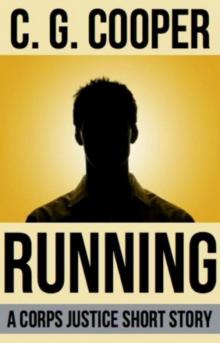 Running
Running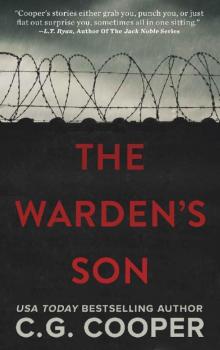 The Warden's Son
The Warden's Son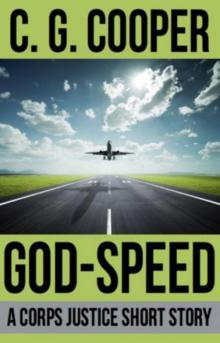 God-Speed
God-Speed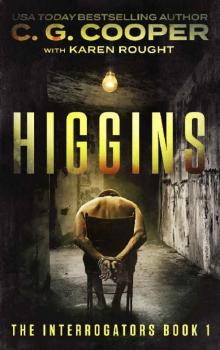 Higgins
Higgins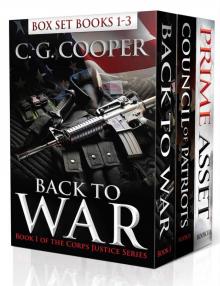 Corps Justice Boxed Set: Books 1-3: Back to War, Council of Patriots, Prime Asset - Military Thrillers
Corps Justice Boxed Set: Books 1-3: Back to War, Council of Patriots, Prime Asset - Military Thrillers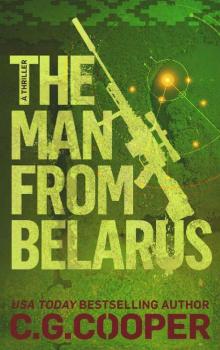 The Man From Belarus (Corps Justice Book 16)
The Man From Belarus (Corps Justice Book 16)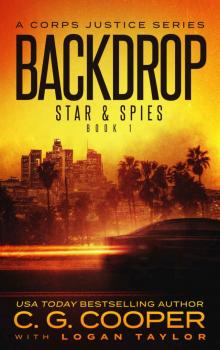 Backdrop: A Corps Justice Series (Stars & Spies Book 1)
Backdrop: A Corps Justice Series (Stars & Spies Book 1)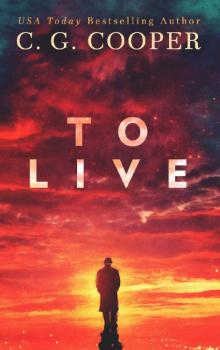 To Live
To Live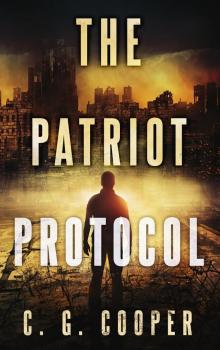 The Patriot Protocol
The Patriot Protocol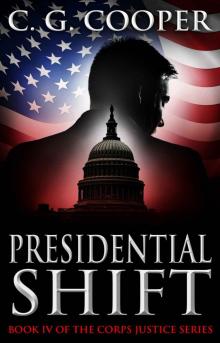 Presidential Shift
Presidential Shift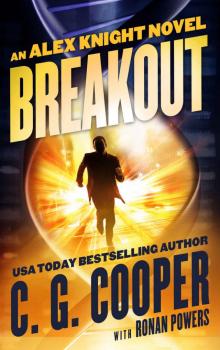 Breakout (Alex Knight Book 1)
Breakout (Alex Knight Book 1)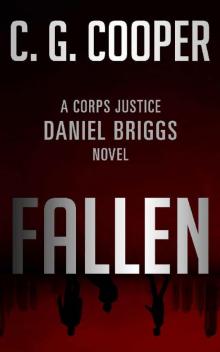 Fallen: A Daniel Briggs Action Thriller (Corps Justice - Daniel Briggs Book 2)
Fallen: A Daniel Briggs Action Thriller (Corps Justice - Daniel Briggs Book 2)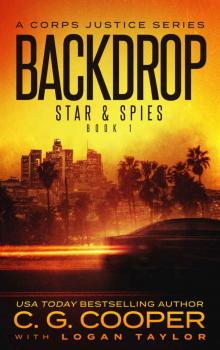 Backdrop
Backdrop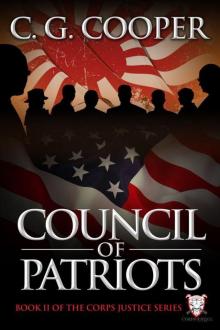 Council of Patriots (The Corps Justice Series Marine Corps Fiction)
Council of Patriots (The Corps Justice Series Marine Corps Fiction)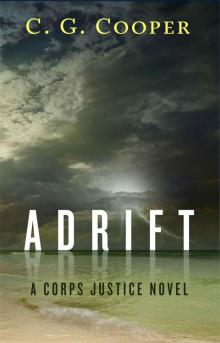 Adrift: The Complete Novel
Adrift: The Complete Novel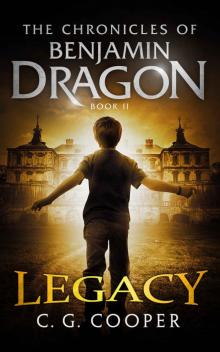 Benjamin Dragon - Legacy (The Chronicles of Benjamin Dragon Book 2)
Benjamin Dragon - Legacy (The Chronicles of Benjamin Dragon Book 2)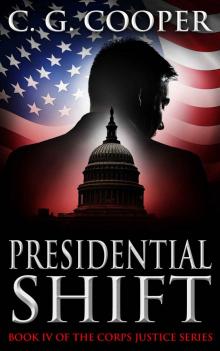 Presidential Shift: A Political Thriller (Corps Justice Book 4)
Presidential Shift: A Political Thriller (Corps Justice Book 4)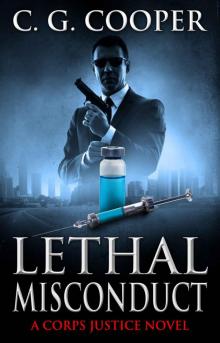 Lethal Misconduct
Lethal Misconduct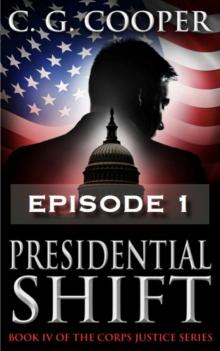 Presidential Shift - Episode 1
Presidential Shift - Episode 1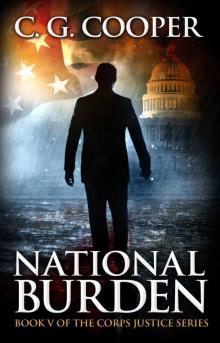 National Burden
National Burden Sabotage
Sabotage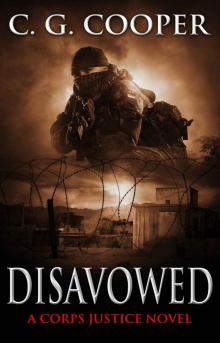 Disavowed
Disavowed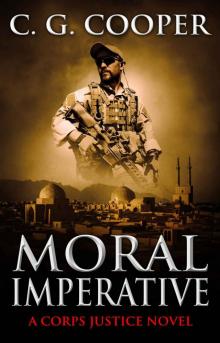 Moral Imperative
Moral Imperative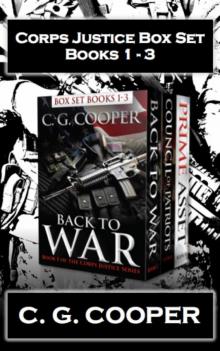 Corps Justice Boxed Set: Books 1-3: Back to War, Council of Patriots, Prime Asset
Corps Justice Boxed Set: Books 1-3: Back to War, Council of Patriots, Prime Asset